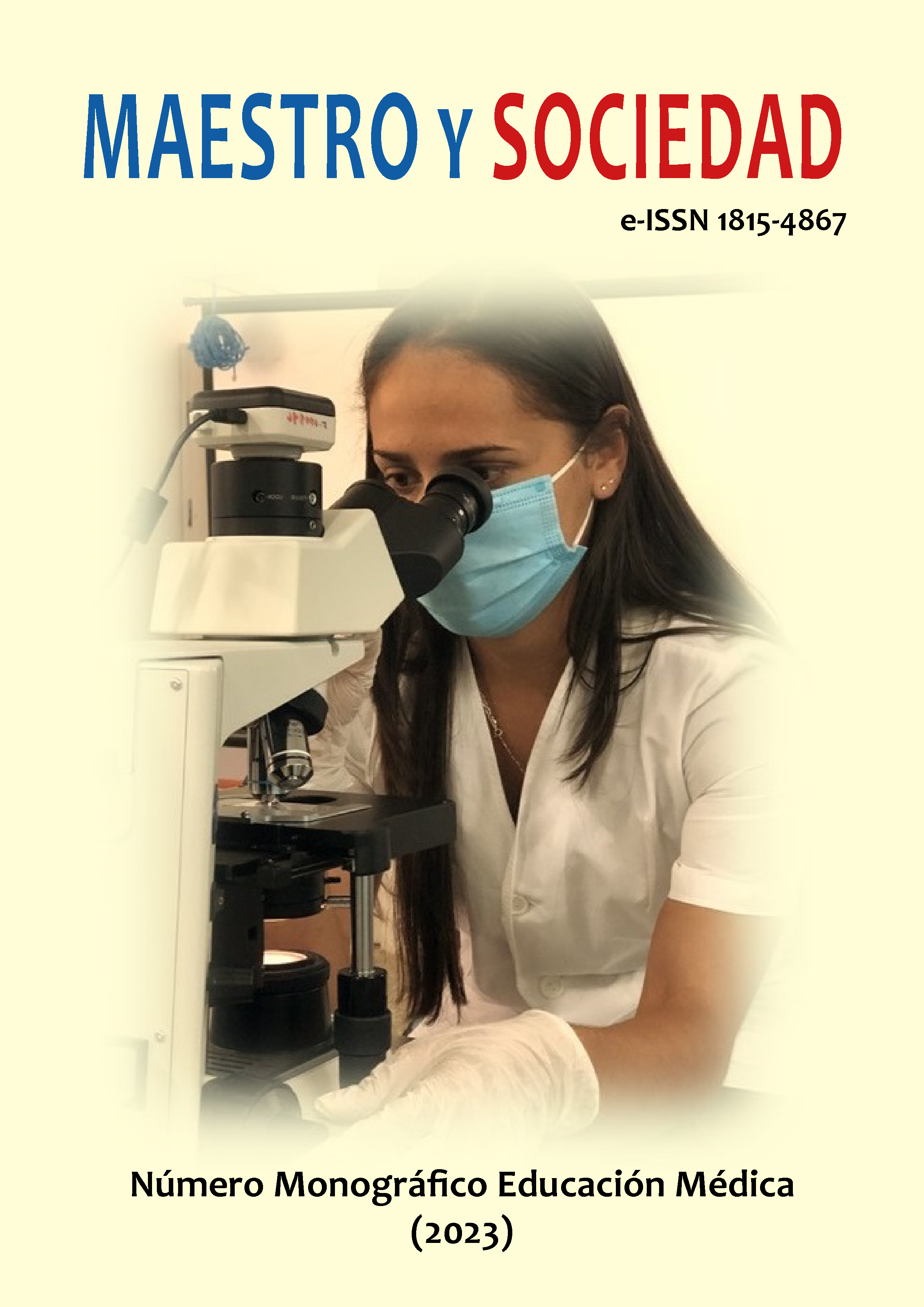Administration psychosocial of seismic risk in the city of Santiago from Cuba
Administration psychosocial of seismic risk in the city of Santiago from Cuba
Keywords:
perception of risk, administration psychosocial of seismic risk, earthquakes, vulnerability, threatsAbstract
Introduction: Cuba is one of the few countries that has a record of events and conceives the reduction of seismic risk in Santiago de Cuba. The objective is to present the design of a psychosocial intervention program to enhance the psychosocial management of seismic risk by defense specialists in the city of Santiago de Cuba. Materials and methods: From the qualitative methodology and an exploratory study, the method that supports the study is Research-Action. The investigation is carried out with the participation of eight research subjects, who are defense specialists in the Santiago de Cuba municipality. Results: The results show that the perceptions of seismic risk in these subjects are characterized by being biased by popular beliefs about the daily actions and preparation that must be carried out before the earthquake; not by structuring analysis of the threat, psychosocial, organizational and functional vulnerabilities. Discussion: The information must be aimed primarily at understanding and preparing for the seismic risk, before the disaster occurs, so that it is timely and that it generates the most complete and full perception of the phenomenon, from the cognitive and affective processes, evidencing that there has been poor communication treatment based on seismic risk management. Conclusions: The perception of seismic risk in the defense specialists of the Santiago de Cuba municipality is characterized by being biased by popular beliefs (based on cognition and not on the cognitive-affective relationship) about the daily actions and preparation that must be do before the earthquake.
References
Álvarez, L.; Mijáilova, R. S.; Vorobiova, E. O.; Chuy-Rodríguez, T. J.; Zhakirdzhánova, G. N.; Pérez, E. R.; Rodiónova, L. M.; Álvarez, H. y Mirzoev, K. M. (2010). Terremotos de Cuba y áreas aledañas. En: Sismicidad de Cuba y estructura de la corteza en el Caribe. Editorial Academia. 7-35.
Aragonéz, J., Talayero, F., and Moyano, E. (2020). Percepción del riesgo en contextos culturales diferentes. Revista de Psicología Social, 18(1), 87-100.
Batista Samé, Y. (2019). Percepción del riesgo sísmico del sector este del municipio de Moa. [Tesis Doctoral, Departamento de Geología, Universidad de Moa].
Bertoldo, R., Tanga, R., Dias, P., Guignard, S., & Schleyer-Lindenmann, A. (2020). Calculative and relational trust in the management of coastal floods and earthquakes: a comparative study. Psy Ecology, 11(2), 193-213.
Cardona, O. (2003). La Necesidad de Repensar de manera Holística los Conceptos de Vulnerabilidad y Riesgo, una Crítica y una Revisión Necesaria para la Gestión. Centro de Estudios sobre Desastres y Riesgos. CENAIS.
CENAIS. (2020). Tabla de los terremotos más importantes de Cuba. www.cenais.cu/tabla/tabla.html
Díaz, S, R., García, T, D.S., Aguilera, Y, Y. & Mendoza R, M. (2021). La educación antisísmica con estudiantes de medicina a través de un proyecto comunitario. Revista Cubana de Medicina Militar, 50(1).
González Reyna, S. (2018). La comunicación persuasiva como instrumento para el cambio de opiniones. Revista mexicana de opinión pública, (25), 185-193.
Lavell, A. (2010). Gestión Ambiental y Gestión del Riesgo de Desastre en el Contexto del Cambio Climático. Red de Estudios en Prevención de Desastres en América Latina y Ambiente. En: http://www.desenredando.org/public/2013/2010-0926_DNP_Lavell-DocumentoConceptualGestionDelRiesgo.pdf
Maskrey, A. (1997). Comunidad y desastres en América Latina: estrategias de intervención. En: LAVELL, A. Viviendo en riesgo. Comunidades vulnerables y prevención de desastres en América Latina. Red de Estudios Sociales en Prevención de Desastres en América Latina.
Montero, M. (2005). La participación y el compromiso en el trabajo comunitario. En Trabajo Comunitario. Selección de Lecturas. Editorial Caminos. La Habana.
Palma, J. L. A. (2020). Sismos en el continente: peligros, vulnerabilidades y riesgos para Cuba. Revista Caribeña de Ciencias Sociales, 9(2).
Parrado Álvarez, O. L., Francis Archer, D. E., & Carrión Cabrera, L. (2019). Percepción del riesgo sísmico en la ciudad de Camagüey. Base para la educación ambiental comunitaria. Transformación, 15(3), 398-415.
Pérez, O., Chuy, T. J. y Martínez, G. (2010). Los acueductos de la ciudad de Santiago de Cuba. Una reseña histórica. En: Proyecto Historia de la Ciencia y la Tecnología en Santiago de Cuba. CITMA y SNTC.
Pérez Figueredo, A. S. (2019). La gestión de riesgos con enfoque inclusivo para el enfrentamiento al cambio climático en zonas costeras de la provincia de Santiago de Cuba. Ciencia en su PC, 1(4), 64-76.
Santana González, Y., Sagaró del Campo, N. M., & Valdés García, L. E. (2021). Percepción de riesgo vs Covid-19 en centros hospitalarios de Santiago de Cuba. Revista Universidad y Sociedad, 13(4), 195-206. https://rus.ucf.edu.cu/index.php/rus/article/view/2157/2138
Suárez Rodríguez, R, C. O., Mercerón Figarola, Y., del Toro Sánchez., M., Ortiz., A. V., & Rojas Rivero., R. M. (2019). Prácticas parentales y sintomatología depresiva en adolescentes cubanos. Revista Iberoamericana De Psicología, 12(1), 19–30. https://doi.org/10.33881/2027-1786.rip.12102
Villalón, G, G. y Savigne, R, S. (2016). Estrategia de comunicación del proyecto ciudades preparadas y alertas. XI Simposio Internacional de Educación y Cultura en II Taller Internacional de Evaluación Educativa y Acreditación de la Evaluación Superior. Matanzas, Cuba.
Downloads
Published
How to Cite
Issue
Section
License
Copyright (c) 2023 Oscar Alonso Leyva, Yorkys Santana González

This work is licensed under a Creative Commons Attribution-NonCommercial-NoDerivatives 4.0 International License.
This journal provides immediate open access to its content, based on the principle that offering the public free access to research helps a greater global exchange of knowledge. Each author is responsible for the content of each of their articles.



























 Universidad de Oriente
Universidad de Oriente 